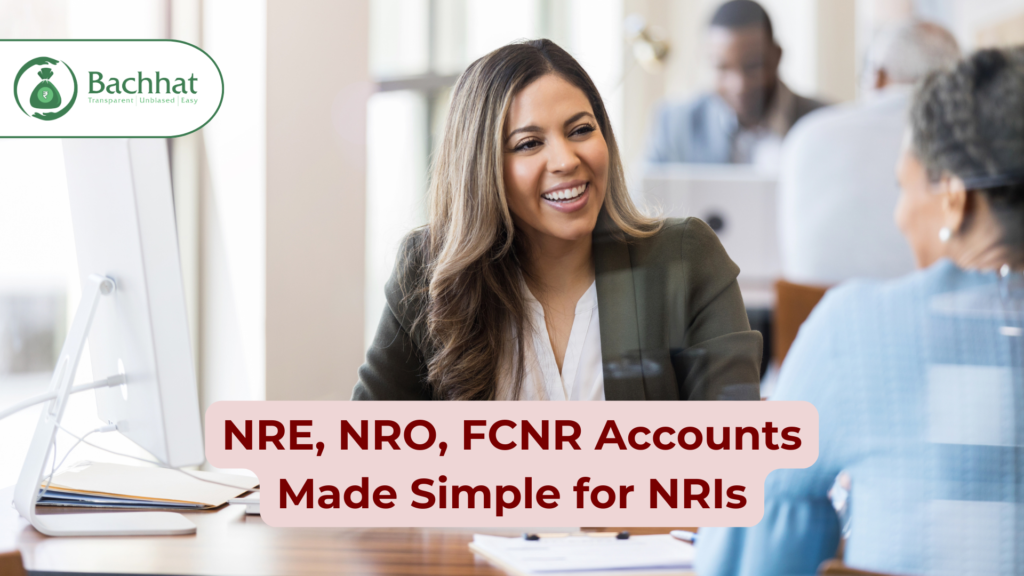NRE, NRO, FCNR Accounts Made Simple for NRIs

If you are an Indian living abroad, you might still want to send money to your family in India, save for the future, or invest back home. To do that, Indian banks offer special types of accounts that are made just for NRIs. But not all accounts are the same.
Let us understand the three main types of NRI accounts: NRE, NRO, and FCNR. We will also look at how you can send or receive money through these accounts and how they are taxed in India.
- NRE Account (Non-Resident External Account)
This is a savings or fixed deposit account where you can keep your foreign income in Indian banks.
- Currency: Maintained in Indian Rupees (INR)
- Source of Money: Only foreign income
- Can you send money to India? Yes
Example: You work in the US and send $2,000 to your NRE account in India. It gets converted to rupees and deposited. - Can you send money back abroad? Yes
Example: You can transfer the entire balance of your NRE account back to your foreign account without limits. - Taxability in India: Interest earned is tax-free in India. However, you may be liable to pay tax in your local jurisdiction (eg: USA) where your global income is taxable.
This account is good if you want to send your earnings from abroad and keep them safe in India, and take them back anytime without restrictions.
- NRO Account (Non-Resident Ordinary Account)
This is also a savings or fixed deposit account, but it is meant for your income earned in India, like rent, pension, dividends, or any Indian source.
- Currency: Maintained in Indian Rupees (INR)
- Source of Money: Indian income
- Can you send money to India? Yes
Example: Besides crediting income received in India, you can also transfer money from overseas in this account - Can you send money back abroad? Yes, but with restrictions
Example: You can repatriate up to USD 1 million per financial year after paying taxes and submitting documents. - Tax in India: Interest is taxable in India as per the slab rate. Bank deducts 30% as TDS on interest earned. In case NRI’s tax liability is lesser than 30%, they need to file return in India to claim refund for excess tax paid.
You may also be liable to pay tax in your local jurisdiction (eg: USA) where your global income is taxable. You can take advantage of DTAA to reduce your tax liability in US by claiming credit of taxes paid in India.
This account is useful if you still have income sources in India and want to manage them legally.
- FCNR Account (Foreign Currency Non-Resident Account)
This is a fixed deposit account where you can keep your money in foreign currency like USD, GBP, EUR, etc. It helps protect your money from exchange rate changes.
- Currency: Maintained in foreign currency (like USD or GBP)
- Source of Money: Only foreign income
- Can you send money to India? Yes
Example: You deposit $10,000 in an FCNR account for 3 years. - Can you send money back abroad? Yes
Example: After 3 years, you can take the entire amount with interest back to your foreign bank account.
- Tax in India: Interest is tax-free in India. However you may be liable to pay tax in your local jurisdiction (eg: USA) where your global income is taxable.
This account is great if you want to earn interest in foreign currency and avoid currency risks.
Summary Table
|
Account Type |
Currency Held |
Source of Funds |
Taxability |
Remittance to India |
Remittance from India |
|
NRE |
Indian Rupees |
Foreign income |
Tax-free |
Allowed |
Allowed freely |
|
NRO |
Indian Rupees |
Indian income |
Taxable |
Allowed |
Allowed with limits |
|
FCNR |
Foreign currency |
Foreign income |
Tax-free |
Allowed |
Allowed freely |
Final Thoughts
Choosing the right bank account depends on where your money is coming from and what you plan to do with it. If your income is from abroad, NRE and FCNR accounts are good options. If you earn from Indian sources, an NRO account is necessary.
Also, remember that taxes are different for each account. Talk to a financial advisor to make the best decision for your needs.
By: Vishal Shah, SEBI Registered Investment Advisor and founder of Bachhat
July 2, 2025
Disclaimer: This is not a financial advice and the readers should reach out to registered investment advisors for any financial advice. Registration granted by SEBI, membership of BASL and certification from National Institute of Securities Markets (NISM) in no way guarantee performance of the intermediary or provide any assurance of returns to investors. Investment in securities market are subject to market risks. Read all the related documents carefully before investing.

